
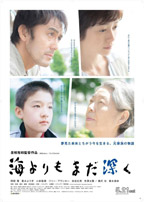
Umi Yorimo Mada Fukaku
Japan 2016
Genre:
Drama
Director:
Hirokazu Koreeda
Cast:
Hiroshi Abe
Kirin Kiki
Yoko Maki
Taiyo Yoshizawa
Sosuke Ikematsu
Lily Franky
Satomi Kobayashi

After the Storm
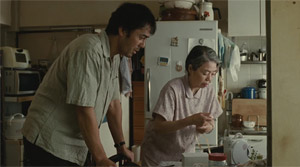
Story: Ryota (Hiroshi Abe) is a writer and has even won a literary award 15 years ago. Since back then he didn't manage to publish another book,
though. He lacks ideas and even though he writes down a few every now and then, he works full-time as a private detective and tails husbands who cheat on their
wives for a living. Officially, he only works in this profession to gain some experience for his new book. But actually, he gambles away the money he earns
right away and thus is never able to pay his alimony to his ex-wife Kyoko (Yoko Maki). She also has a new boyfriend as Ryoto is quite aware of since he is
tailing her as well. Ryoto wants to win back Kyoko as he isn't just still attached to her but also to their son Shingo (Taiyo Yoshizawa). After the death of his
father he visits his mother (Kirin Kiki) because he hopes to find something valuable of his father he can turn into money. When his hope proves to be in vain
he plans to invite his ex-wife and son to his mother while a typhoon is hitting the country so that they need to stay overnight. Maybe he can win over his
family that night after all...

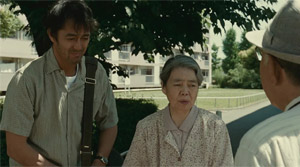
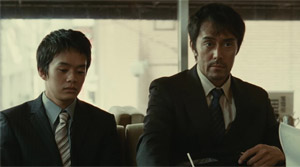

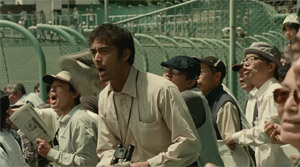
Review: "After the Storm" is a drama of impressive subtlety and worldly wisdom which in no way turns out to be pretentious art house cinema
and also offers easily accessable, but very delicately written individuals. The different layers of this bittersweet drama make you assume that the film might be
based on a novel. But in fact the screenplay is written by Hirokazu Koreeda ("Our Little Sister",
"After Life") himself, who also manages to get the maximum out of his story thanks to his reserved directing. Often enough we
hear critics say that this or that director succeeds in exploring the complexity of life in an outstanding subtle manner and what we really get is a movie that
makes us struggle with tiredness setting in. Not when it comes to "After the Storm". The pacing may be unhurried, but there is constantly something happening
that also emotionally connects us to the characters.
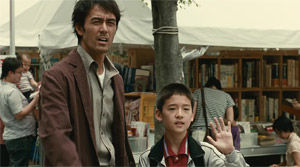
The fear that the main part of the film may take place indoors, because of the typhoon that is, which in the most presumptuous way possible is supposed to
stress that this is a serious drama, is also completely unfounded. We get some insight into Ryota's life and watch the man at work, with his family and at a
betting office. That's also where the astounding effort of the director becomes apparent since we can warm up to Ryota, even though the list of his weaknesses
isn't short at all. He surely has a gambling problem, he deceives his clients and even blackmails them if need be, wants to steal money from his mother and
lies whenever possible. As things progress we also learn, however, that this man, who couldn't give up chasing after his dream, is also somewhat forced into
a corner here.
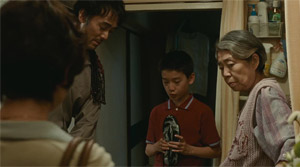
Still, the movie doesn't try to find any excuse for Ryota's actions. When it comes to his son, we instantly see, though, that he would do anything for him.
Furthermore, he regrets the things that lie in the past. The fact that he wants to get together with his family again and for that purpose not just stalks
his family, but also forges one or two egoistic plans, easily could give the impression that "After the Storm" actually doesn't have anything extraordinary to
tell. But that's not true. Ryota resembles his father, who he couldn't stand, very much, but doesn't realize this or only very late, when he relives his
childhood with his son, only in switched roles. His son Shingo on the other hand is quite aware that his father is a loser in the classical sense, yet has
come to terms with this and accepts him for what he is. Therefore, he is much more mature than what's normal for a boy his age.
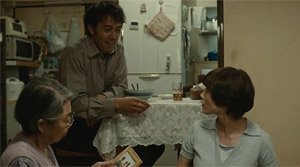
Ryota's ex-wife may seem a bit cold, but it's soon apparent that she simply tries to be the strong one in the family who calculates logically what would be
best for her son. Especially during one scene between Ryota's mother and her it becomes clear that the women in this story maybe are even the ones suffering
the most, but who nonetheless have their sight always set on the future, quite contrary to the men who cling to the past. There are a few very intense and
well done scenes, particularly the dialogues, when finally the true feelings are revealed. Here, the power of some wonderful dialogues woven into the film
is made great use of, which in their subtlety or at times also clarity manage to resonate with you long after the film. The film's original title "Even Deeper
Than the Sea", actually a love song by Taiwanese singer Teresa Teng, needs to be interpreted a lot more profoundly looking at it within the framework of this
movie as well.

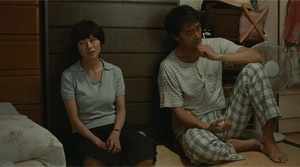
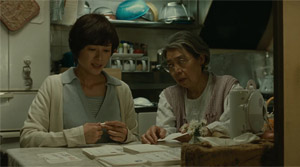

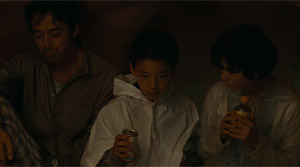
Hiroshi Abe ("The Blue Bird", "Chocolate") delivers a very sophisticated performance, but the rest of the cast is fantastic as well and creates characters which are overwhelming in their deepness, meaning that we can outright feel the weight of life on their shoulders. "After the Storm" is a wonderful picture about dreams, giving them up and in the end about nothing less than the meaning of life. This most importantly also means to regret and be able to let go. The drama's motives are profound and deeply rooted in the different individuals. Particularly towards the end it turns out that the family may not be one anymore, but that there is still a strong familiarity between them and that shared scars as well as the love for one's son can in fact tie them together. So you probably shouldn't expect a happy ending in the classical sense, but in its own way the ending is extremely satisfying and leaves you with the feeling that important aspects of life have been examined here very carefully.

Disclaimer










